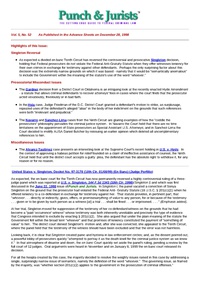Here the 11th Circuit followed the majority rule that a defendant is not eligible for a Rule 35(b) sentence reduction filed more than a year after sentencing, even if the Government alleges that the defendant's information was not useful before then.
Here the Government filed a Rule 35(b) …
Here the Court held that the cocaine conspiracy statute could be applied extraterritorially to the defendant who was a Canadian citizen so long as his actions produced some effect in the U.S. or some overt acts of the conspiracy were committed in the U.S.
The defendant in this …
Case is noted for the willingness of the courts to pamper the prosecutors by deleting from the final version of its decision all reference to the name of the individual prosecutor who violated the rights of the defendant.
We conclude our round-up of notable year-end cases dealing with …
When reading cases from the Ninth Circuit, it is always important to note the makeup of the panel. To a greater degree than any other Circuit, the outcome of criminal cases in the Ninth Circuit depends on whether the panel comes from the right wing of the court or …
We conclude our round-up of notable year-end cases dealing with prosecutorial misconduct by including the instant case. At its best, it is a revealing reminder of the fawning and solicitous deference too often to paid to the prosecutors; and, at its worst, it is a sad example of how …
Here the Court held that a "vulnerable victim" enhancement under USSG § 3A1.1(b) is appropriate even when the economic effect of the offense is felt by a non-vulnerable entity such as the government.
The defendants, husband and wife, operated a residence for mentally retarded adults, which was funded …
In many ways the year 1998 brought into focus both the extraordinary role of the prosecutors in shaping the criminal justice system and the absence of any meaningful curbs on their awesome power. The instant case is important because it shows that help may be on the way. It …
As expected, the en banc court for the Tenth Circuit has now permanently reversed a highly controversial ruling of a three-judge panel which was reported at U.S. v. Singleton, 144 F.3d 1343 (10th Cir. 1998) (Singleton I) and which was first discussed in the June 22, 1998 issue of …
Among its many reasons for dismissing various counts alleging false statements in violation of 18 U.S.C. §§ 1001 and 2(b), Judge Friedman made the following observations: "To recite the bare factual allegations of the indictment and the words of Sections 1001 and 2(b), however, does not capture the Alice-in-Wonderland-like …
In 1997, the Supreme Court reversed a long line of Ninth Circuit precedents holding, in U.S. v. Hyde, 520 U.S. 670 (1997), that a criminal defendant does not have an absolute right to withdraw a guilty plea for any reason until the district court accepts both the guilty plea …
This case is noted for its affirmation that, despite the Supreme Court's ruling in U.S. v. Hyde, a defendant still has the absolute right to withdraw a guilty plea before it is accepted by the court, "for any reason or for no reason".
In 1997, the Supreme Court …
QUOTE OF THE WEEK - Some interesting observations by Chief Justice Rehnquist on the federalization of every sensational and heinous State crime.
"The trend to federalize crimes that traditionally have been handled in state courts not only is taxing the Judiciary's resources and affecting its budget needs, but it …
This decision is one of three related decisions by Judge Friedman addressing a series of pretrial motions filed in a high-profile illegal campaign contribution case. Because there were allegations that the defendant carried on some of her illegal fund raising activities at the White House itself, the case was …
This decision is one of three related decisions by Judge Friedman addressing a series of pretrial motions filed in a high-profile illegal campaign contribution case. Because there were allegations that the defendant carried on some of her illegal fund raising activities at the White House itself, the case was …
Here the Court held that the district court had not abused its discretion when it permitted the empanelment of an anonymous jury because it had taken appropriate safeguards to minimize any risk of infringement upon the rights of the defendant.
The Court ruled: "Under 28 U.S.C. § 1863(b)(7), …
